Superpower describes a state or supranational union that holds a dominant position characterized by the ability to exert influence or project power on a global scale. This is done through the combined means of economic, military, technological, political, and cultural strength as well as diplomatic and soft power influence. Traditionally, superpowers are preeminent among the great powers. While a great power state is capable of exerting its influence globally, superpowers are states so influential that no significant action can be taken by the global community without first considering the positions of the superpowers on the issue.
Masaaki Hatsumi, formerly Yoshiaki Hatsumi, is the founder of the Bujinkan Organization and is the former Togakure-ryū soke (grandmaster). He no longer teaches, but currently resides in Noda, Chiba, Japan.
In international relations, power is defined in several different ways. Material definitions of state power emphasize economic and military power. Other definitions of power emphasize the ability to structure and constitute the nature of social relations between actors. Power is an attribute of particular actors in their interactions, as well as a social process that constitutes the social identities and capacities of actors.

The healthcare industry is an aggregation and integration of sectors within the economic system that provides goods and services to treat patients with curative, preventive, rehabilitative, and palliative care. It encompasses the creation and commercialization of products and services conducive to the preservation and restoration of well-being. The contemporary healthcare sector comprises three fundamental facets, namely services, products, and finance. It can be further subdivided into numerous sectors and categories and relies on interdisciplinary teams of highly skilled professionals and paraprofessionals to address the healthcare requirements of both individuals and communities.

A great power is a sovereign state that is recognized as having the ability and expertise to exert its influence on a global scale. Great powers characteristically possess military and economic strength, as well as diplomatic and soft power influence, which may cause middle or small powers to consider the great powers' opinions before taking actions of their own. International relations theorists have posited that great power status can be characterized into power capabilities, spatial aspects, and status dimensions.
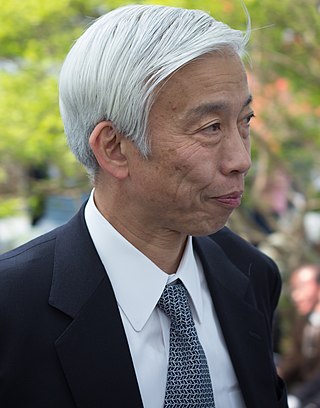
Moriteru Ueshiba is a Japanese master of aikido. He is a grandson of Morihei Ueshiba, founder of aikido, and son of Kisshomaru Ueshiba. Ueshiba is the third and current Doshu of the Aikikai.
Kisshomaru Ueshiba was a prominent Japanese master of aikido. He was the son of Morihei Ueshiba, founder of aikido, and became the international leader of aikido after his father's death.

69 is a roman à clef novel by Ryu Murakami. It was published first in 1987. It takes place in 1969, and tells the story of some high school students coming of age in an obscure Japanese city who try to mimic the counter-culture movements taking place in Tokyo and other parts of the world.
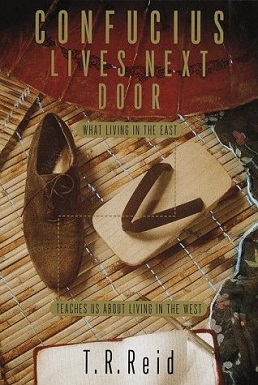
Confucius Lives Next Door: What Living in the East Teaches Us About Living in the West is a 1999 book by Washington Post writer T.R. Reid.

Donald Richie was an American-born author who wrote about the Japanese people, the culture of Japan, and especially Japanese cinema. Although he considered himself primarily a film historian, Richie also directed a number of experimental films, the first when he was seventeen.
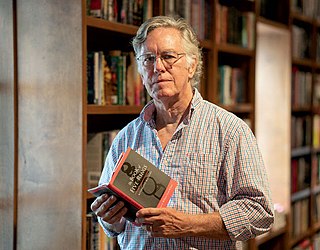
William Scott Wilson is known for translating several works of Japanese literature, mostly those relating to the martial tradition of that country. Wilson has brought historical Chinese and Japanese thought, philosophy, and tactics to the West in his translations of famous East Asian literature.
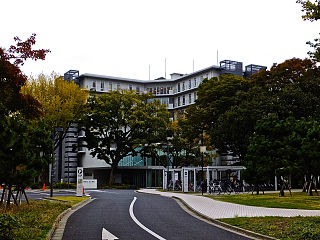
The health care system in Japan provides different types of services, including screening examinations, prenatal care and infectious disease control, with the patient accepting responsibility for 30% of these costs while the government pays the remaining 70%. Payment for personal medical services is offered by a universal health care insurance system that provides relative equality of access, with fees set by a government committee. All residents of Japan are required by the law to have health insurance coverage. People without insurance from employers can participate in a national health insurance program, administered by local governments. Patients are free to select physicians or facilities of their choice and cannot be denied coverage. Hospitals, by law, must be run as non-profits and be managed by physicians.

Musashi, also listed as Musashi: An Epic Novel of the Samurai Era, is a Japanese epic novel written by Eiji Yoshikawa, about the life and deeds of legendary Japanese swordsman Miyamoto Musashi.
Hirokazu Kanazawa was a Japanese master of Shotokan karate. He was the Chief instructor and President of the Shotokan Karate-Do International Federation, an organisation he founded after he left the Japan Karate Association (JKA). Kanazawa was ranked 10th dan in Shotokan Karate.

Tadao Satō was a Japanese film critic, theorist and historian. His real name was Tadao Iiri.
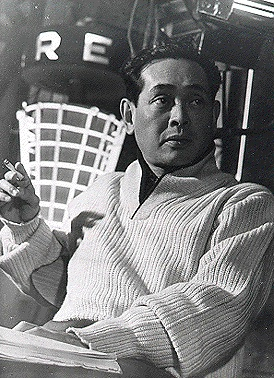
Keisuke Kinoshita was a Japanese film director and screenwriter. While lesser-known internationally than contemporaries such as Akira Kurosawa, Kenji Mizoguchi and Yasujirō Ozu, he was a household figure in his home country, beloved by both critics and audiences from the 1940s to the 1960s. Among his best known films are Carmen Comes Home (1951), Japan's first colour feature, Tragedy of Japan (1953), Twenty-Four Eyes (1954), You Were Like a Wild Chrysanthemum (1955), Times of Joy and Sorrow (1957), The Ballad of Narayama (1958), and The River Fuefuki (1960).

The level of health in Japan is due to a number of factors including cultural habits, isolation, and a universal health care system. John Creighton Campbell, a professor at the University of Michigan and Tokyo University, told the New York Times in 2009 that Japanese people are the healthiest group on the planet. Japanese visit a doctor nearly 14 times a year, more than four times as often as Americans. Life expectancy in 2013 was 83.3 years - among the highest on the planet.

A potential superpower is a state or other polity that is speculated to be—or to have the potential to soon become—a superpower.
Kobo, the Li'l Rascal, also known as Kobo-chan (コボちゃん), is a manga created by Masashi Ueda. Kodansha published three volumes of the manga as a bilingual Japanese-English editions, and Kodansha America distributed the book in the United States.

The Healing of America: A Global Quest for Better, Cheaper, and Fairer Health Care is a New York Times bestseller from journalist T. R. Reid. Reid compares health care systems in a half-a-dozen wealthy nations with the health care models followed in the United States, in a straightforward, easy to read narrative. The countries whose systems are discussed are: France, Germany, Japan, the United Kingdom, Canada and a specific example from India. Reid visited all these countries personally and claims to have chosen them since they exemplify specific kinds of health-care system models. The book also discusses transitions in the health care systems of Taiwan and Switzerland.














